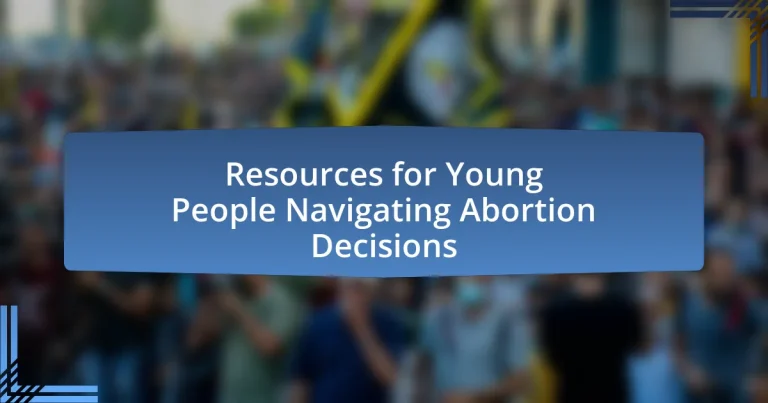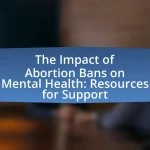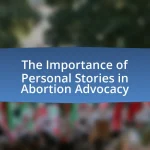The article focuses on the key resources available for young people navigating abortion decisions, highlighting healthcare providers, counseling services, and educational materials. It outlines how young individuals can access information about abortion options through reliable sources, including online platforms like Planned Parenthood and the Guttmacher Institute. The article also discusses the support systems in place, such as counseling services and peer support groups, and addresses the legal rights and financial considerations that impact decision-making. Additionally, it examines the emotional and psychological factors young people face, societal attitudes towards abortion, and practical tips for making informed choices.
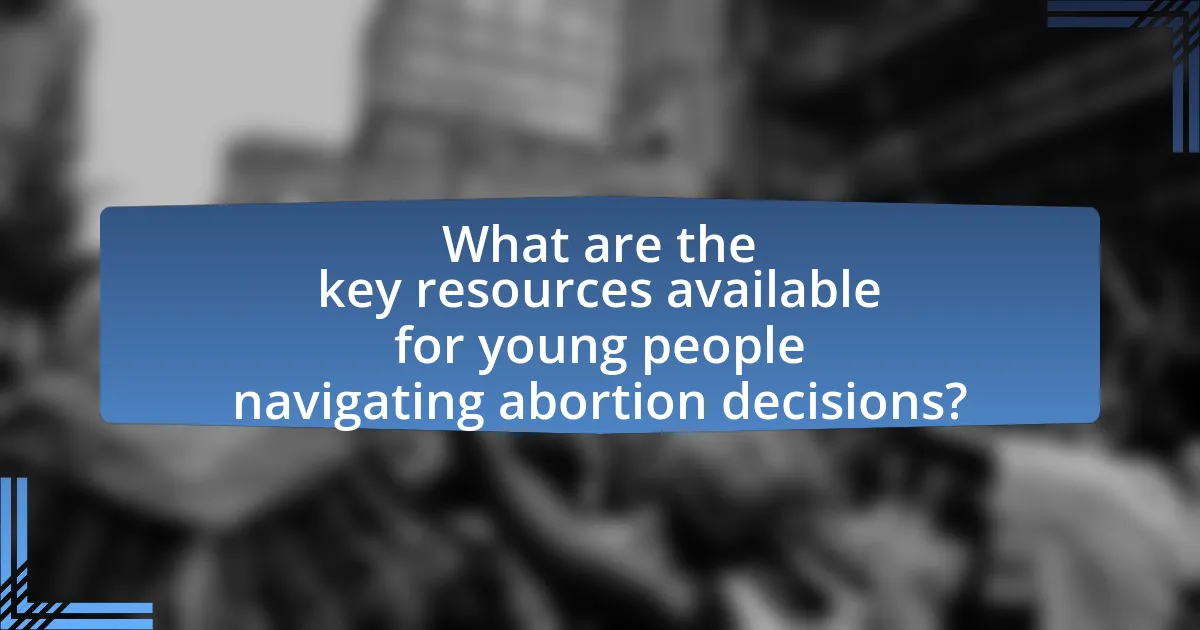
What are the key resources available for young people navigating abortion decisions?
Key resources available for young people navigating abortion decisions include healthcare providers, counseling services, and educational materials. Healthcare providers, such as Planned Parenthood, offer confidential consultations and medical services related to abortion. Counseling services, like the National Abortion Federation, provide emotional support and guidance throughout the decision-making process. Educational materials from organizations such as the Guttmacher Institute offer evidence-based information on reproductive health, including abortion options and legal rights. These resources ensure that young people have access to accurate information and support when making informed decisions about abortion.
How can young people access information about abortion options?
Young people can access information about abortion options through various reliable sources, including healthcare providers, educational institutions, and online platforms. Healthcare providers, such as clinics and hospitals, offer confidential consultations and resources about different abortion methods, legal rights, and aftercare. Educational institutions often provide access to sexual health education programs that include information on reproductive health and abortion options. Additionally, reputable online platforms, such as Planned Parenthood and the Guttmacher Institute, offer comprehensive guides and resources that detail the types of abortion available, the procedures involved, and the legal considerations in different regions. These sources ensure that young people receive accurate and up-to-date information to make informed decisions regarding their reproductive health.
What online platforms provide reliable information on abortion?
Planned Parenthood, the Guttmacher Institute, and the World Health Organization are online platforms that provide reliable information on abortion. Planned Parenthood offers comprehensive resources on abortion services, reproductive health, and legal rights in various states. The Guttmacher Institute conducts research and provides data on reproductive health policies, including abortion statistics and trends. The World Health Organization offers global guidelines and health information regarding safe abortion practices and reproductive health. These platforms are recognized for their accuracy and credibility in the field of reproductive health.
How can young people find local clinics or healthcare providers?
Young people can find local clinics or healthcare providers by utilizing online resources such as health department websites, clinic locator tools, and telehealth services. Websites like Planned Parenthood and the National Abortion Federation offer searchable databases that allow individuals to find nearby clinics based on their location. Additionally, local health departments often provide information on available healthcare services, including reproductive health. According to the Guttmacher Institute, 90% of women seeking abortion services live within 50 miles of a clinic, indicating that access is often closer than perceived.
What support systems exist for young people facing abortion decisions?
Support systems for young people facing abortion decisions include counseling services, hotlines, and peer support groups. Counseling services, such as those provided by Planned Parenthood, offer confidential guidance and information about options, helping individuals make informed choices. Additionally, hotlines like the National Abortion Federation’s hotline provide immediate support and resources. Peer support groups, often facilitated by organizations like Exhale, allow young people to share experiences and receive emotional support from others who have faced similar decisions. These systems are designed to ensure that young individuals have access to the necessary information and emotional backing during a challenging time.
How can counseling services assist in the decision-making process?
Counseling services assist in the decision-making process by providing a supportive environment where individuals can explore their feelings, values, and options regarding abortion. These services facilitate informed choices by offering accurate information about the medical, emotional, and social aspects of abortion, which helps individuals weigh the potential consequences of their decisions. Research indicates that individuals who engage in counseling are more likely to make decisions that align with their personal values and circumstances, leading to greater satisfaction with their choices.
What role do peer support groups play in navigating abortion choices?
Peer support groups play a crucial role in navigating abortion choices by providing emotional support, shared experiences, and practical information. These groups create a safe space for individuals to discuss their feelings and concerns about abortion, which can alleviate feelings of isolation and anxiety. Research indicates that peer support can enhance decision-making processes, as individuals often benefit from hearing diverse perspectives and coping strategies from others who have faced similar situations. For instance, a study published in the Journal of Adolescent Health found that participants in peer support groups reported increased confidence in their decision-making regarding reproductive health choices, including abortion. This demonstrates that peer support groups not only foster a sense of community but also empower individuals to make informed decisions about their reproductive health.
What legal rights do young people have regarding abortion?
Young people have the legal right to access abortion services, which varies by jurisdiction. In the United States, for instance, minors can obtain an abortion with parental consent or notification in many states, while some states allow minors to seek a judicial bypass to obtain an abortion without parental involvement. According to the Guttmacher Institute, as of 2021, 37 states require parental involvement in a minor’s abortion decision, highlighting the legal landscape that young people navigate. Additionally, the right to abortion is protected under the constitutional right to privacy, as established in the landmark case Roe v. Wade, although this has been subject to ongoing legal challenges and changes.
What are the age-related legal requirements for obtaining an abortion?
The age-related legal requirements for obtaining an abortion vary by jurisdiction, but generally, individuals under the age of 18 may require parental consent or notification. In many states in the United States, minors must either obtain consent from a parent or guardian or seek a judicial bypass to proceed with the abortion without parental involvement. For instance, as of 2023, 37 states require parental involvement in a minor’s abortion decision, while 13 states do not have such requirements. These laws are designed to ensure that minors have support and guidance during the decision-making process.
How can young people understand parental consent laws?
Young people can understand parental consent laws by researching their specific state’s legal requirements regarding consent for medical procedures, including abortion. Each state has different laws that dictate whether minors need parental consent or notification, and these laws can vary significantly. For instance, as of 2023, 37 states require parental involvement in a minor’s decision to have an abortion, while others allow minors to seek judicial bypass options to avoid parental consent. Accessing reliable resources such as state health department websites, legal aid organizations, or youth advocacy groups can provide accurate information and guidance on navigating these laws effectively.
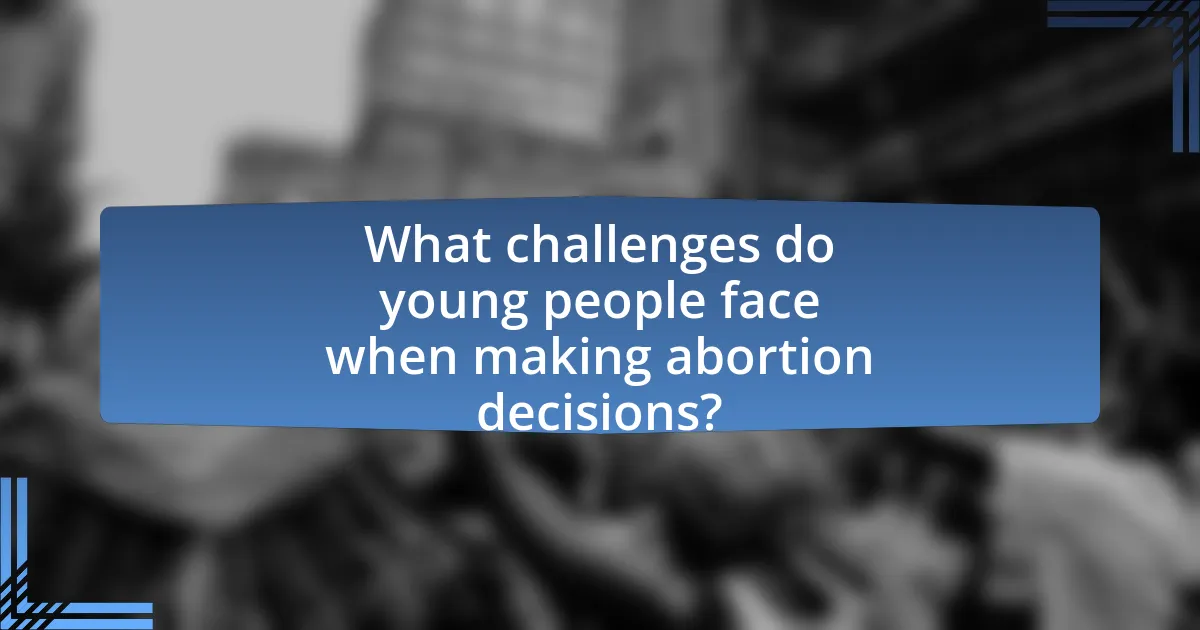
What challenges do young people face when making abortion decisions?
Young people face several challenges when making abortion decisions, including lack of access to accurate information, social stigma, and financial constraints. Many young individuals may not have comprehensive sexual education, leading to misinformation about their options and the procedures involved. Social stigma surrounding abortion can create feelings of shame or fear of judgment from peers and family, which may hinder open discussions and support. Additionally, financial constraints can limit access to healthcare services, as young people may not have the means to cover the costs associated with the procedure or travel to clinics. These factors collectively complicate the decision-making process for young individuals considering abortion.
How do societal attitudes impact young people’s choices about abortion?
Societal attitudes significantly influence young people’s choices about abortion by shaping their perceptions, beliefs, and access to information. For instance, in communities where abortion is stigmatized, young individuals may feel pressured to conform to prevailing norms, leading to increased anxiety and reluctance to seek abortion services. Research from the Guttmacher Institute indicates that young people in regions with restrictive abortion laws and negative societal attitudes are less likely to access safe abortion services, often resorting to unsafe methods. Furthermore, supportive societal attitudes can empower young individuals to make informed choices, as seen in countries with comprehensive sex education and open discussions about reproductive health, which correlate with lower rates of unintended pregnancies and abortions.
What stigma do young people encounter when considering abortion?
Young people encounter significant stigma when considering abortion, primarily stemming from societal judgments and cultural beliefs. This stigma often manifests as fear of being labeled irresponsible or immoral, leading to feelings of shame and isolation. Research indicates that 61% of young women report feeling judged by peers and family members regarding their abortion decisions, which can deter them from seeking necessary support and resources. Additionally, the stigma can be exacerbated by misinformation about abortion, contributing to a lack of understanding and empathy from the community.
How can young people overcome fear of judgment from peers or family?
Young people can overcome fear of judgment from peers or family by developing self-acceptance and seeking supportive environments. Building self-acceptance involves recognizing one’s own values and beliefs, which can reduce the impact of external opinions. Engaging with supportive friends, mentors, or groups that share similar experiences fosters a sense of belonging and validation. Research indicates that social support significantly mitigates feelings of isolation and fear, as highlighted in a study published in the Journal of Adolescent Health, which found that adolescents with strong support networks reported lower levels of anxiety related to peer judgment.
What emotional and psychological factors should young people consider?
Young people should consider feelings of anxiety, guilt, and fear when navigating abortion decisions. These emotions can arise from societal stigma, personal beliefs, and the potential impact on relationships. Research indicates that young individuals often experience heightened emotional responses due to a lack of support and understanding from their social circles, which can exacerbate feelings of isolation (Guttmacher Institute, 2021). Additionally, psychological factors such as self-esteem and coping mechanisms play a crucial role in how young people process their experiences and make decisions regarding abortion. Understanding these emotional and psychological factors is essential for making informed choices and seeking appropriate support.
How can young people cope with feelings of guilt or anxiety related to abortion?
Young people can cope with feelings of guilt or anxiety related to abortion by seeking support from trusted friends, family, or mental health professionals. Engaging in open conversations about their feelings can help normalize their experiences and reduce isolation. Research indicates that talking about emotions can lead to better mental health outcomes, as seen in studies published in the Journal of Adolescent Health, which highlight the importance of social support in alleviating anxiety. Additionally, practicing self-care techniques such as mindfulness, journaling, or participating in support groups can provide emotional relief and foster resilience.
What resources are available for mental health support during this time?
Mental health support resources available during this time include hotlines, counseling services, and online platforms specifically designed for young people navigating abortion decisions. For instance, the National Alliance on Mental Illness (NAMI) offers a helpline that provides free, confidential support and resources. Additionally, organizations like Planned Parenthood provide counseling services and mental health resources tailored to individuals facing abortion-related decisions. Research indicates that access to mental health support can significantly improve emotional well-being during challenging times, highlighting the importance of utilizing these resources.
What financial considerations are involved in abortion decisions?
Financial considerations in abortion decisions include the cost of the procedure, potential travel expenses, and the impact on future financial stability. The average cost of an abortion in the United States ranges from $300 to $1,500, depending on the gestational age and type of procedure. Additionally, individuals may incur costs related to transportation if they need to travel to a facility, especially in areas with limited access to abortion services. Furthermore, the decision may affect future financial situations, as carrying a pregnancy to term can lead to increased expenses for childcare, healthcare, and education. These financial factors are critical in the decision-making process, as they can influence an individual’s ability to afford the procedure and their long-term financial health.
How can young people find financial assistance for abortion services?
Young people can find financial assistance for abortion services through various organizations and programs that specifically support reproductive health. For instance, the National Network of Abortion Funds provides a directory of local funds that can help cover costs associated with abortion procedures. Additionally, Planned Parenthood offers financial assistance options and can connect individuals with resources in their area. Research indicates that many states have specific funds available for low-income individuals seeking abortion services, further enhancing access to necessary care.
What are the costs associated with different abortion procedures?
The costs associated with different abortion procedures vary significantly based on the method used and geographical location. For instance, a medication abortion typically ranges from $300 to $800, while an in-clinic suction aspiration procedure can cost between $500 and $3,000. Additionally, later-term abortions, which may involve more complex procedures, can exceed $10,000 in some cases. These costs can be influenced by factors such as insurance coverage, facility fees, and local regulations. According to the Guttmacher Institute, the average cost of an abortion in the United States is approximately $508 for a first-trimester procedure, highlighting the financial considerations young people must navigate when making abortion decisions.
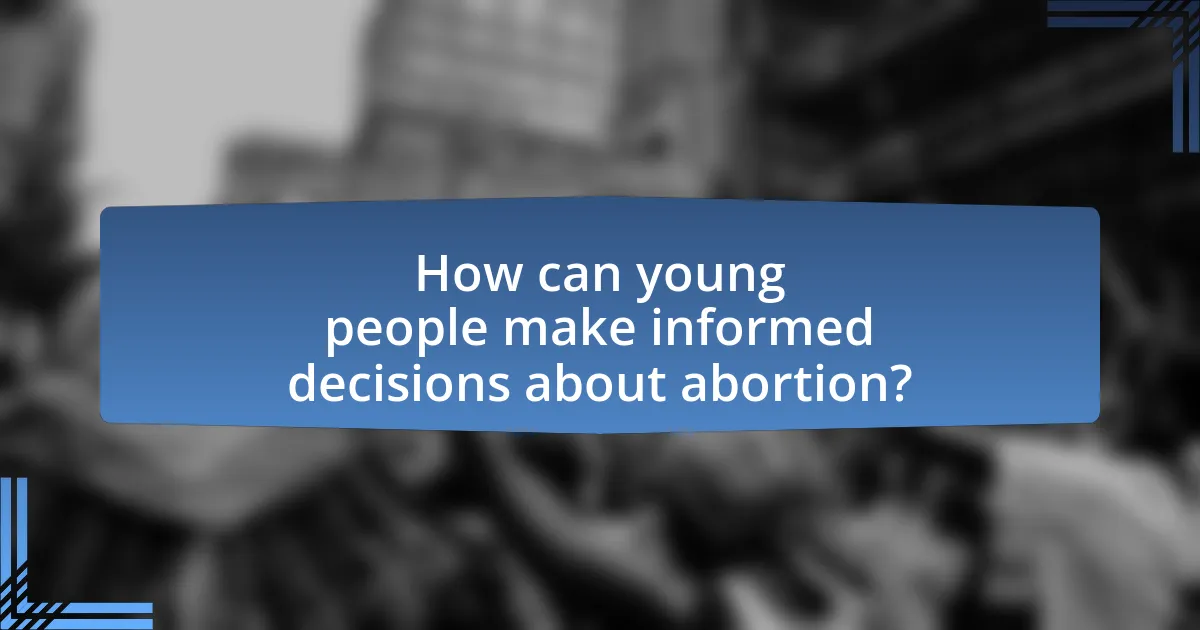
How can young people make informed decisions about abortion?
Young people can make informed decisions about abortion by accessing reliable information, consulting healthcare professionals, and considering their personal circumstances. Reliable information can be obtained from reputable sources such as Planned Parenthood and the Guttmacher Institute, which provide comprehensive data on abortion options, procedures, and potential risks. Consulting healthcare professionals, such as doctors or counselors, ensures that young individuals receive personalized advice based on their health and situation. Additionally, reflecting on personal values, beliefs, and support systems can guide young people in making choices that align with their individual circumstances.
What factors should young people weigh when considering abortion?
Young people should weigh emotional, physical, financial, and social factors when considering abortion. Emotionally, they must assess their readiness to handle the psychological impact of the decision, which can include feelings of guilt or relief. Physically, they should consider their health and the potential risks associated with the procedure, as complications can arise in some cases. Financially, the cost of the procedure and any associated healthcare expenses must be evaluated, as well as the potential impact on their future financial stability. Socially, they should reflect on their support system, including family and friends, and how their decision may affect their relationships and social standing. Each of these factors plays a crucial role in making an informed and personal decision regarding abortion.
How can personal values influence the decision-making process?
Personal values significantly influence the decision-making process by shaping individual priorities and guiding choices. For instance, a person who values autonomy may prioritize personal choice in reproductive decisions, while someone who values family may consider the impact of their decision on relatives. Research indicates that values serve as a framework through which individuals evaluate options, leading to decisions that align with their beliefs and ethical standards. This alignment can be particularly crucial in sensitive contexts, such as abortion, where personal values directly affect the perceived moral implications and emotional outcomes of the decision.
What role does the timing of the decision play in the options available?
The timing of the decision significantly influences the options available for individuals navigating abortion decisions. Early decisions typically allow for a wider range of choices, including medical abortions, which are generally available up to 10 weeks into a pregnancy. As time progresses, options may become limited, with surgical procedures becoming the primary method after the first trimester. Research indicates that access to abortion services can vary based on state laws and gestational limits, emphasizing the importance of timely decision-making. For instance, the Guttmacher Institute reports that many states impose restrictions that can affect availability as the pregnancy advances, underscoring the critical role of timing in determining accessible options.
What are the best practices for discussing abortion with trusted individuals?
The best practices for discussing abortion with trusted individuals include creating a safe and open environment, actively listening, and being respectful of differing opinions. Establishing a comfortable setting encourages honest dialogue, while active listening ensures that all parties feel heard and valued. Respecting differing opinions fosters a constructive conversation, allowing for a deeper understanding of the complexities surrounding abortion. Research indicates that supportive communication can significantly impact decision-making processes, highlighting the importance of these practices in sensitive discussions.
How can young people approach conversations with parents or guardians?
Young people can approach conversations with parents or guardians by preparing their thoughts and choosing an appropriate time to talk. This preparation includes understanding their own feelings and the information they wish to convey, which can help facilitate a more open and honest dialogue. Research indicates that effective communication strategies, such as active listening and expressing feelings without blame, can significantly improve the quality of these discussions. For instance, a study published in the Journal of Adolescent Health found that adolescents who engage in respectful and clear communication with their parents are more likely to receive support and understanding regarding sensitive topics, including abortion decisions.
What strategies can help in discussing abortion with friends or partners?
To effectively discuss abortion with friends or partners, it is crucial to approach the conversation with empathy, openness, and factual information. Initiating the dialogue in a safe and private environment encourages honest expression of thoughts and feelings. Utilizing active listening techniques allows individuals to understand differing perspectives, which is essential given that 61% of Americans believe abortion should be legal in all or most cases, according to a 2021 Gallup poll. Presenting accurate data and resources, such as statistics on abortion rates and access to healthcare, can help ground the discussion in reality and dispel myths. Additionally, being prepared for emotional responses and maintaining a respectful tone fosters a constructive atmosphere for dialogue.
What practical tips can assist young people in navigating abortion decisions?
Young people can navigate abortion decisions effectively by seeking comprehensive information, consulting healthcare professionals, and considering emotional support systems. Accessing reliable resources, such as Planned Parenthood or the Guttmacher Institute, provides factual data on options, procedures, and potential outcomes. Engaging with healthcare providers ensures personalized medical advice tailored to individual circumstances, while discussing feelings and concerns with trusted friends or counselors can help in processing the emotional aspects of the decision. Research indicates that informed decision-making leads to better outcomes, highlighting the importance of education and support in this context.
How can young people prepare for a visit to a healthcare provider regarding abortion?
Young people can prepare for a visit to a healthcare provider regarding abortion by gathering relevant medical history, understanding their options, and formulating questions. Collecting information such as menstrual cycle details, any previous pregnancies, and current medications helps the healthcare provider offer tailored advice. Familiarizing themselves with different abortion methods, including medication and in-clinic procedures, allows for informed discussions. Additionally, preparing specific questions about the procedure, potential risks, and aftercare ensures clarity and addresses concerns. This preparation is crucial as studies indicate that informed patients are more likely to have positive healthcare experiences and outcomes.
What questions should young people ask when seeking abortion services?
Young people seeking abortion services should ask the following questions: What are the available abortion methods, and how do they differ in terms of procedure and recovery? Understanding the types of abortion, such as medication abortion and in-clinic procedures, is crucial for informed decision-making. Additionally, they should inquire about the costs involved, including whether insurance covers the procedure and what financial assistance options are available. Knowing the timeline for the procedure and any necessary follow-up care is also important. Furthermore, young individuals should ask about the confidentiality of the services and whether parental consent is required, as laws vary by location. Lastly, they should seek information on counseling services and support resources available before and after the procedure to ensure emotional well-being.
